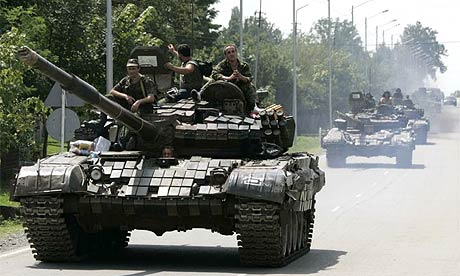Re: Georgian-South Ossetian conflict
BREAKING NEWS --- Saakashvili's an idiot...err wait...that's not breaking news!
**********************
Georgia Says Leaving CIS
source: http://www.asbarez.com/index.html?sh...40_8/12/2008_1
TBILISI (Combined Sources)-- Georgia President Mikhail Saakashvili announced that his embattled nation will leave the Commonwealth of Independent States (CIS) which was created after the Soviet Union dissolved in 1991.
"We are leaving the CIS for good.....and encourage others to do so," he reportedly told supporters in the capital of Tbilisi in an email sent to Newsmax by Georgian authorities.
The CIS is composed of 15 of the former Soviet republics and has been a loose confederation of economic and political ties. Some of those states, namely Georgia and Ukraine, have repeatedly charged that Moscow has used the association to bully many of the former Soviet states.
Now, with Georgia breaking ranks, the question is: how many more will follow?
Ukraine, perhaps the most important of the former Soviet republics outside Russia -- and a close ally of Georgia -- is said to be seriously considering the Georgian lead. A complete breakup of the CIS could leave Moscow politically isolated around its borders.
Even as Moscow announced a cessation of its military campaign in Georgia, its U.N. ambassador, Vitaly Churkin, raised an ominous specter. Churkin, who has repeatedly denied U.S. accusations that Moscow wants to overthrow the Georgian government, did seem to confirm those allegations when he spoke of the Georgian president.
"He is not a man we can do business with," Churkin said Monday, leaving Georgians "to draw the proper conclusions."
The Russian representative also noted that if the French delegation tried to force the Security Council to vote on a cease-fire resolution, he would veto it.
"Why should we vote on something we were not consulted on?" he asked journalists.
U.S./U.N. Ambassador Zalmay Khalilzad told reporters that he sensed a softening of the Russian position, but he criticized Russia's continuing attempts to stall any U.N. action.
U.N. Secretary-General Ban Ki-moon, perhaps acknowledging the U.N.'s inability to address the Russian-Georgian crisis, remained on vacation at a secure, undisclosed location.
BREAKING NEWS --- Saakashvili's an idiot...err wait...that's not breaking news!

**********************
Georgia Says Leaving CIS
source: http://www.asbarez.com/index.html?sh...40_8/12/2008_1
TBILISI (Combined Sources)-- Georgia President Mikhail Saakashvili announced that his embattled nation will leave the Commonwealth of Independent States (CIS) which was created after the Soviet Union dissolved in 1991.
"We are leaving the CIS for good.....and encourage others to do so," he reportedly told supporters in the capital of Tbilisi in an email sent to Newsmax by Georgian authorities.
The CIS is composed of 15 of the former Soviet republics and has been a loose confederation of economic and political ties. Some of those states, namely Georgia and Ukraine, have repeatedly charged that Moscow has used the association to bully many of the former Soviet states.
Now, with Georgia breaking ranks, the question is: how many more will follow?
Ukraine, perhaps the most important of the former Soviet republics outside Russia -- and a close ally of Georgia -- is said to be seriously considering the Georgian lead. A complete breakup of the CIS could leave Moscow politically isolated around its borders.
Even as Moscow announced a cessation of its military campaign in Georgia, its U.N. ambassador, Vitaly Churkin, raised an ominous specter. Churkin, who has repeatedly denied U.S. accusations that Moscow wants to overthrow the Georgian government, did seem to confirm those allegations when he spoke of the Georgian president.
"He is not a man we can do business with," Churkin said Monday, leaving Georgians "to draw the proper conclusions."
The Russian representative also noted that if the French delegation tried to force the Security Council to vote on a cease-fire resolution, he would veto it.
"Why should we vote on something we were not consulted on?" he asked journalists.
U.S./U.N. Ambassador Zalmay Khalilzad told reporters that he sensed a softening of the Russian position, but he criticized Russia's continuing attempts to stall any U.N. action.
U.N. Secretary-General Ban Ki-moon, perhaps acknowledging the U.N.'s inability to address the Russian-Georgian crisis, remained on vacation at a secure, undisclosed location.











Comment